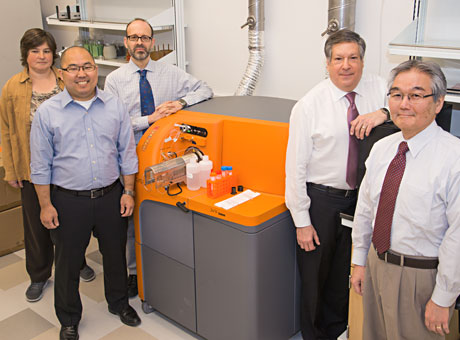
Robert Boston
The center’s new time-of-flight mass cytometer simultaneously detects more than 50 different structures either on the cell surface or inside the cell, providing important clues to the identity of the cells and the functions they perform. From left, center leaders Olga Malkova, PhD; Stephen Oh, MD, PhD; Michael Diamond, MD, PhD; Robert Schreiber, PhD; and Wayne Yokoyama, MD.
A new center will help scientists use the power of the immune system to fight infections and cancers.
The Center for Human Immunology and Immunotherapy Programs (CHiiPs) is part of BioMed21, the university’s initiative to accelerate basic science discoveries into improved diagnosis and treatment for patients. The center is housed in the BJC Institute of Health at Washington University.
Scientists also are developing ways to restrain the immune system when it mistakenly attacks healthy tissue, leading to autoimmune disorders.
“Several very important basic discoveries in these areas have been made by Washington University faculty, but it has been challenging to move those discoveries into the clinic,” said CHiiPs director Robert D. Schreiber, PhD, the Alumni Professor of Pathology and Immunology.
Pioneering researchers at the medical school have shown that the immune system can recognize cancers and regulate their growth.
Pioneering researchers at the medical school have shown that the immune system can recognize cancers and regulate their growth. The scientists also have identified ways to manipulate the immune system’s ability to destroy cancer cells. The school has been a leader in developing vaccines for emergent diseases such as West Nile virus and in identifying cells and molecules involved in autoimmune conditions.
A center laboratory will monitor changes in the immune system during clinical trials of new immunotherapies.
“Until now, faculty performing immunological clinical trials or studying unique immunologic clinical syndromes had to set up these tests in their own labs, which is a lot of work and doesn’t always produce standardized results,” Schreiber said.
The center’s leaders are recruiting faculty interested in applying immunological discoveries to clinical problems.







